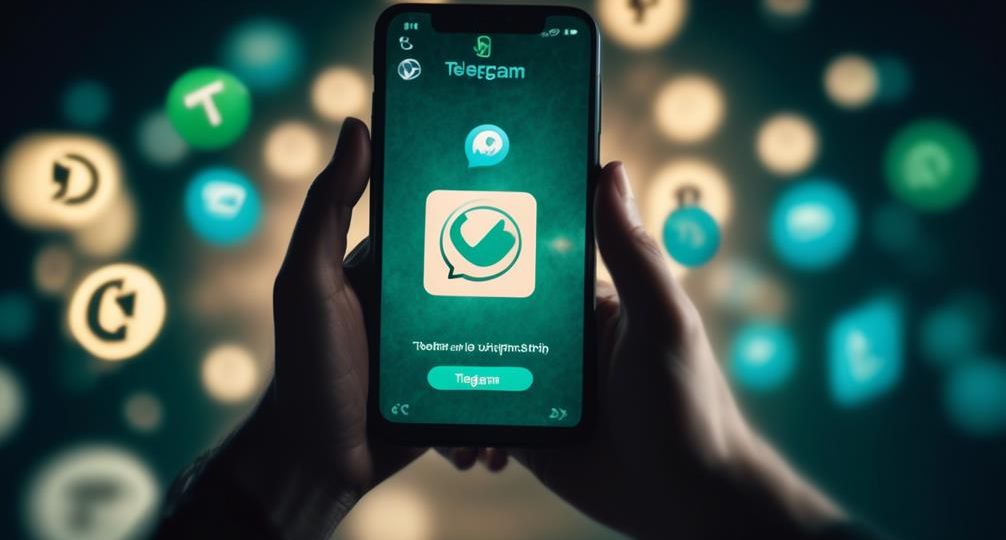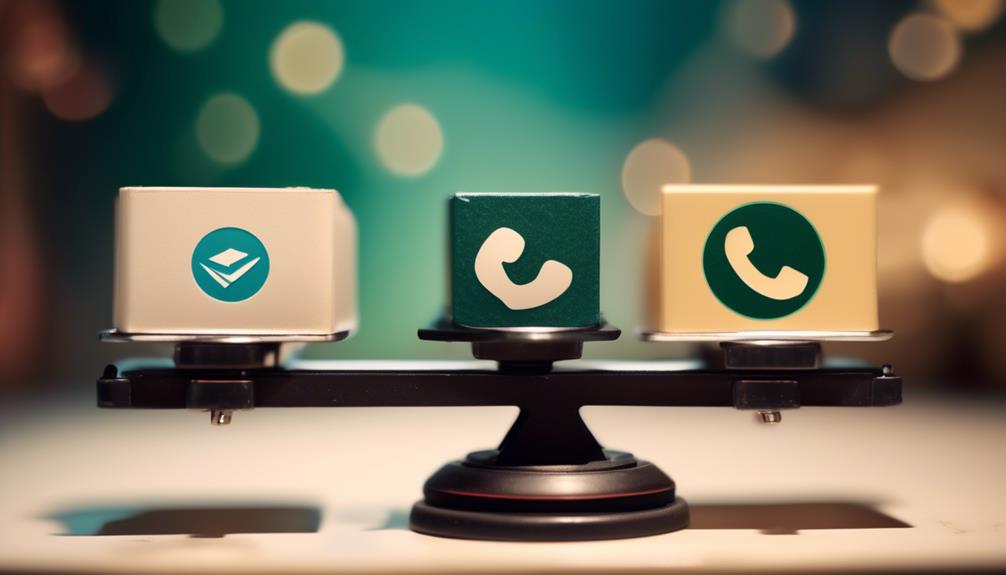
Can I use Telegram like WhatsApp?
Imagine you’ve just installed Telegram, enticed by the rave reviews from your tech-savvy friends.
As you navigate through the app, you can’t help but notice its striking similarities with Whatsapp, right from the user interface to the chat features.
However, you’re left wondering, can you really use Telegram like Whatsapp?
There’s certainly more to explore about these two popular messaging apps, and it’s time to unravel what sets them apart, how they overlap, and ultimately, what it means for you as a user.
Key Takeaways
- Telegram offers robust customization options for the interface, allowing users to personalize their experience with backgrounds, chat colors, and notification sounds.
- Secret chats in Telegram provide enhanced security and privacy, with end-to-end encryption and self-destruct timers for messages.
- Telegram’s cloud-based architecture allows access to messages from multiple devices, a feature not currently available in Whatsapp.
- While both Telegram and Whatsapp offer end-to-end encryption, Telegram’s encryption standards are slightly more advanced with the use of the MTProto protocol.
Understanding Telegram’s Core Features

To get the most out of Telegram, it’s crucial to understand its core features that set it apart from apps like WhatsApp.
One of the key features is Telegram customization. You’re not limited to a standard look and feel; you can tailor the interface to match your preferences. Backgrounds, chat colors, even notification sounds can be modified. This level of personalization enhances user experience, making it easier for you to navigate and enjoy your conversations.
Another standout feature is Secret chats. Unlike regular chats, secret chats are end-to-end encrypted, meaning only you and the recipient can read the messages. It’s not stored on Telegram’s servers, so there’s no chance of third parties accessing your information. Plus, you can set a self-destruct timer for messages, making your chats more secure.
How Telegram Compares to Whatsapp
While enjoying these unique features of Telegram, you might wonder how it stacks up against WhatsApp, a widely-used messaging app. Both platforms offer end-to-end encryption, ensuring that only you and your conversation partner can read the messages. However, Telegram’s encryption standards are slightly more robust, as they use the MTProto protocol, which provides more security layers.
When it comes to privacy policies, Telegram holds an edge. Unlike WhatsApp, it doesn’t share data with third parties. Telegram’s cloud-based architecture also allows you to access your messages from multiple devices, a feature that WhatsApp currently doesn’t offer.
Functionality-wise, both apps have their merits. Telegram allows you to send files of up to 2GB, while WhatsApp limits this to 100MB. However, WhatsApp’s user interface is more user-friendly, making it easier for less tech-savvy individuals to navigate.
Pros and Cons of Switching to Telegram

Switching to Telegram, like any other decision, comes with its own set of advantages and drawbacks you’ll need to consider.
One of the most significant security advantages of Telegram is its end-to-end encryption feature. This ensures that only you and the recipient can read what’s sent, and nobody in between, not even Telegram. Its cloud-based nature also lets you access your messages from various devices, providing flexibility that’s hard to beat.
However, there are feature limitations to consider. While Telegram offers innovative and unique features like self-destructing messages and chatbots, it lacks some of the popular features that WhatsApp users enjoy. One such feature is the ‘Status Updates,’ a tool that lets you share text, photos, videos, and GIFs that disappear after 24 hours, similar to Instagram and Snapchat stories.
Also, Telegram’s user base is smaller than WhatsApp’s, which means fewer of your contacts might be using it. But remember, you’re at the forefront of innovation.
In the end, the decision to switch to Telegram will depend on what you value more: enhanced security and flexibility, or a larger user base and familiar features. It’s a trade-off you’ll have to evaluate.
User Experience: Telegram Vs Whatsapp
Drawing from the trade-offs you’ve already considered, let’s now explore how Telegram and Whatsapp compare in terms of user experience.
Telegram shines in its commitment to privacy. It offers end-to-end encryption, allowing only senders and recipients to read messages. Privacy concerns are further alleviated as Telegram doesn’t share your data with third parties, unlike Whatsapp, which has faced criticism for its data sharing policy with Facebook.
When it comes to platform compatibility, both apps are versatile. They function seamlessly on various platforms including iOS, Android, and Windows. However, Telegram takes a step further, offering a native app for Linux users, a feature Whatsapp lacks.
The user interface on both platforms is intuitive and user-friendly, but Telegram offers more customization options. You can change chat themes, create your own stickers, and even use a built-in photo editor.
In terms of features, Telegram outpaces Whatsapp with its large group capacity, channel feature, and ability to send large files. However, Whatsapp excels in video calling, a feature Telegram is still refining.
Making the Decision: Telegram or Whatsapp

Deciding between Telegram and Whatsapp often boils down to individual preferences, weighing each app’s unique features against your specific communication needs. Both platforms offer messaging services, but they differ significantly in certain areas, requiring a careful analysis of what matters most to you.
- Privacy Concerns:
Telegram takes the lead here. Unlike Whatsapp, Telegram allows you to engage in secret chats that leave no trace on the company’s servers. The platform emphasizes privacy, granting you full control over who sees your ‘last seen’ status and who can add you to groups.
- Messaging Encryption:
Both platforms use end-to-end encryption, ensuring only you and the recipient can read your messages. However, Whatsapp automatically encrypts all chats, while Telegram only does so for its secret chats.
- Innovation:
If you’re a fan of the avant-garde, Telegram might be your pick. It’s constantly introducing new features, such as chat folders and advanced group controls. Whatsapp, on the other hand, has a more consistent, streamlined design.
In essence, your choice hinges on what you prioritize. If privacy concerns and innovation are high on your list, Telegram will serve you well. If you prefer automatic encryption and a simpler interface, you might lean towards Whatsapp.

